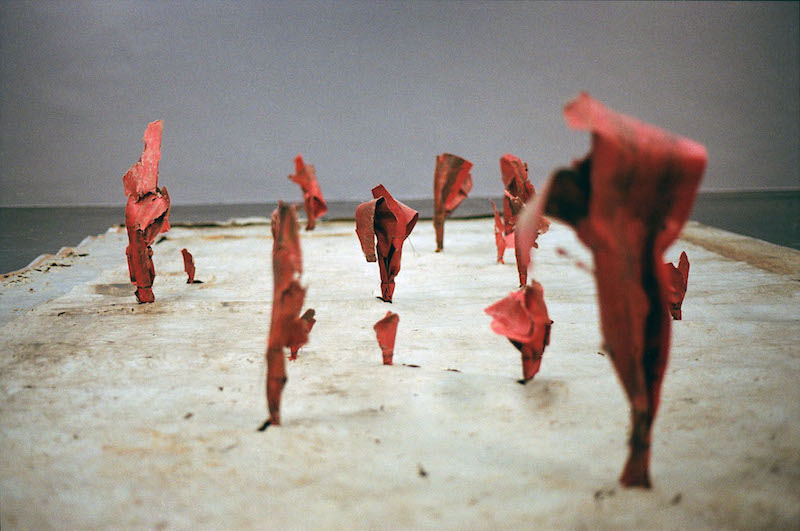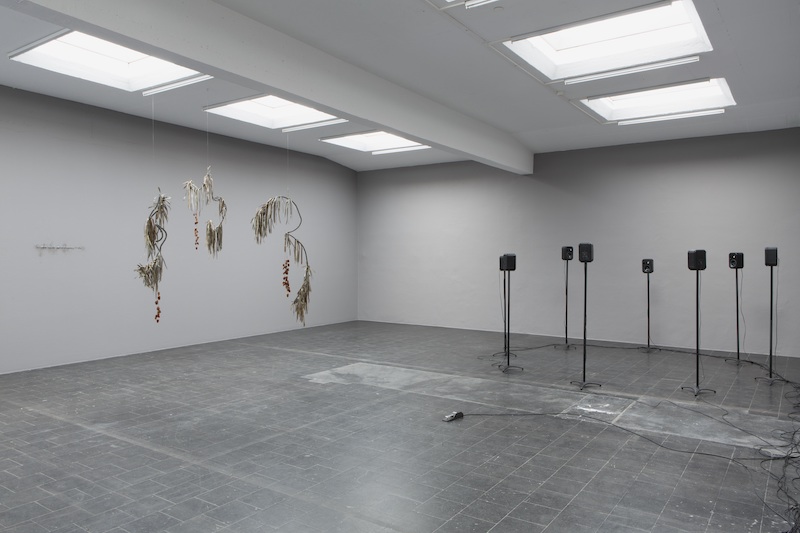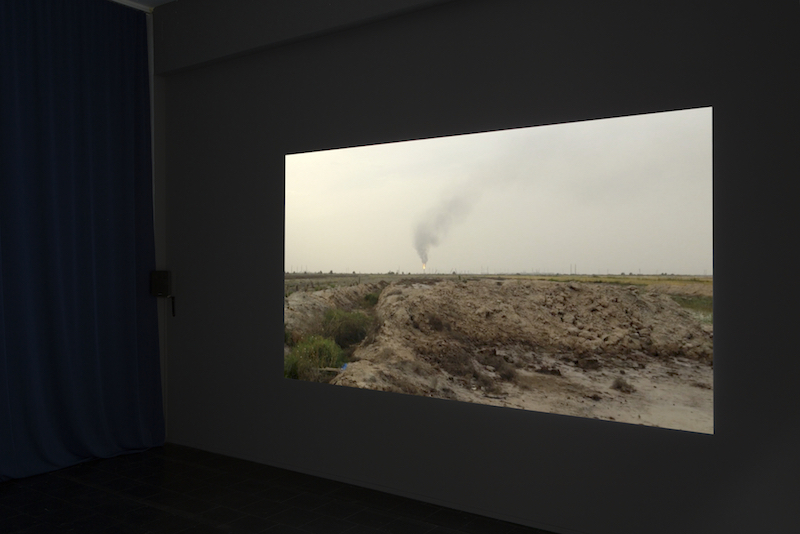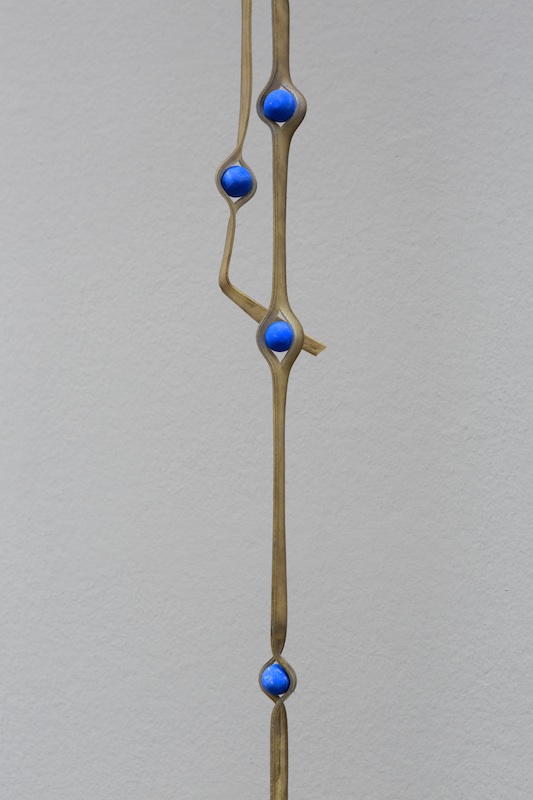Article by Denisa Tomkova // Dec. 03, 2019
Berlin-based, US-born and Iraq-raised artist Rheim Alkadhi is currently exhibiting her work, which comments on the oil fields of Southern Iraq, at Temporary Gallery in Cologne. ‘Majnoon Field’ is curated by Aneta Rostkowska and tells the story of this specific area of oil extraction and the international weapons trade in Southern Iraq. As the curatorial text very precisely illustrates, this part of Iraq houses “more than 65 billion barrels, or about 60% of the total Iraqi oil. The wells produce thousands and millions of tons of drilling waste that pollutes the soil and air of the area.” This has an impact on the air and water pollution in the area, and the consequent water crisis in Iraq, which led the spread of illness in Basra.

Rheim Alkadhi: ‘Harvest of Flames’, 2019, industrial transport tarpaulins, metal hardware, // Photo by Christiane Schmidt, Courtesy of Temporary Gallery
The exhibition gives the impression of a dystopian landscape, by leaving lots of space between the works, creating an almost severe environment. The use of technical materials employed to produce these objects—like industrial transport tarpaulins, metal hardware or PVC strips—reference environmental crises and excessive waste. The dystopian landscape of ‘Majnoon Field’ should, however, not be seen in isolation, but rather as a global condition of environmental destruction we are all facing today. The artist explains: “Majnoon is the condition of the entire planet. We should all be triggered continuously.”
Alkadhi invites us into dialogue on environmental questions and our place on Earth. Entering the space, the first exhibited installation is the sound piece ‘Makeshift Auditorium.’ It represents the “earthworkers,” who announce themselves via 8 speakers arranged in a circle. The work is relational in the sense that the sound piece is activated by the visitor walking on the stepper attached to the speakers. This demonstrates the responsiveness of the work to its audience, it turns the visitors from observers to active participants, who are invited to take part in collective care.

Rheim Alkadhi: ‘Makeshift Auditorium’, 2019, sound piece, 8 channels of audio speakers // Photo by Tamara Lorenz, Courtesy of Temporary Gallery
The artist explains that “to announce oneself present is to give meaning to one’s actions, to have a name where numbers are far more convenient identifiers.” The earthworkers form the pivotal theme of this exhibition. Alkadhi bases the idea of earthworkers on three references: the first is art historical, based on the idea of Earthworks, central to the Land Art movement. The artist clarifies that this movement seems “to have objectified the substance of our ecology and soil into nearly ‘marketable’ parcels, gaining cultural capital (as privileged artists do) from the real estate of western art history books.” The second reference is feminist, it responds to “this predominantly male appropriation by actively counteracting the violence of extraction: turning, tending, repairing the Earth.” And, lastly, is the “prescient future narrative.” Earthworks, then, in the show, function as something physical that materializes one’s duties towards the environmental struggles and dystopian landscape, but also something metaphorical, in the sense of cultural capital and violence. Alkadhi skillfully creates the space for thinking and reflection, which is informative and discursive and, at the same time, also very abstract and poetic.

Rheim Alkadhi: ‘Majnoon Field’, 2019, video, installation view // Photo by Tamara Lorenz, Courtesy of Temporary Gallery
In the exhibited video work ‘Majnoon Field’, Alkadhi echoes the earthworkers again. The video depicts the grass and marshes surrounding the oil fields. Installed in a separate small room, the visitors’ full attention is on the projected film. We are, again, presented with a very dystopian landscape, where earthworkers walk us through the fields. The video depicts the inventory of chemicals, additives and toxic spill-off from the oil industry that are found in the soil there.
This exhibition has strong links to Rostkowska’s curatorial practice as a whole, including its attention to ‘care’ and references to literature. Her last exhibition at Temporary Gallery, ‘Heart of an Old Crocodile Exploding Over a Small Town’ invited us to focus our attention to “universal hospitality.” The ‘Majnoon Field’ exhibition encourages us to care for and to participate in the active reparation of our planet. Similarly, Alkadhi stresses that “to be an earthworker is to draw attention to injustice; and to participate in the long practice of repair.”
The exhibition ‘Majnoon Field’ is an intelligent and urgent appeal for our collective care. In the feminist sense, it encourages us to be earthworkers. Space is given to each of the works in the exhibition and the show is accompanied by a short story by Egyptian writer, Haytham El-Wardany, commissioned by the curator. The exhibition requires viewers to delve into the topic, to think and to engage. This is not to say that the installations do not have aesthetic merit, but rather that one needs to work a bit: to become a earthworker oneself, with aim to practice care collectively.

Rheim Alkadhi: ‘Electric Bue Gobstoppers’, 2019, confection, PVC strip // Photo by Tamara Lorenz, Courtesy of Temporary Gallery
Exhibition Info
TEMPORARY GALLERY
Rheim Alkadhi: ‘Majnoon Field’
Exhibition: Aug. 31 – Dec. 15, 2019
Mauritiuswall 35, 50676 Cologne, click here for map


























